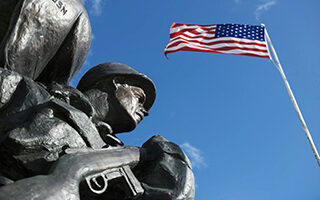
More than 160,000 Allied troops took part in the decisive D-Day invasion of 1944. The battle took place June 6 on the beaches of Normandy, France. It’s considered by many to be the single most important event of World War II. It helped free Western Europe from Nazi control.
American soldiers made up about half of the D-Day forces. And many of them were Texans. Let’s take a look at one of the better-known Texas heroes leading the way that day.
James Earl Rudder was born in Eden, Texas, in 1910. He joined the U.S. Army Reserves shortly after graduating from Texas A&M University in 1932. He went active duty in 1941 as U.S. involvement in the war picked up. By 1944, he was commanding officer of the Army’s Second Ranger Battalion—portrayed in the movie “Saving Private Ryan.” The group was also known as Rudder’s Rangers.
A little after 7 a.m. on D-Day, Rudder’s Rangers stormed the beach at Pointe du Hoc where German forces had set up artillery positions. The Rangers were under constant fire but still scaled the 100-foot cliffs and overtook and destroyed the German gun batteries. Rudder was injured twice in the battle, and he lost about half of his Rangers. Their efforts played a major role in the invasion, establishing a beachhead and nullifying the guns that would have slaughtered Allied troops on nearby beaches.
By 1957, Rudder had been promoted to major general of the Army Reserves. He was one of the most decorated soldiers of World War II, earning such honors as the Distinguished Service Cross, the Legion of Merit and the Silver Star. He died in 1970.
Today, there’s a monument to Rudder and the Second Ranger Battalion at Pointe du Hoc. It consists of a granite pillar mounted atop a German bunker. It has an inscription in French and English and overlooks Omaha Beach. Much of the surrounding landscape has been left the way it was after the battle.
Veteran Energy is thankful for James Rudder, his Rangers and all who put everything on the line in service of this country. And we’ll continue to support veterans, military personnel and their families.


